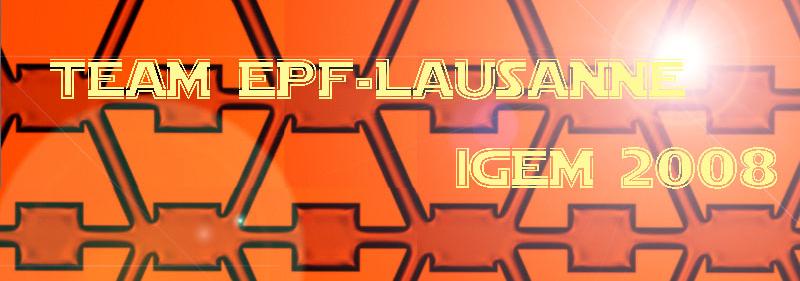Team:EPF-Lausanne
From 2008.igem.org
| Line 13: | Line 13: | ||
Our project aims to use quorum sensing to make 2 color patterns using E coli bacteria. | Our project aims to use quorum sensing to make 2 color patterns using E coli bacteria. | ||
These cells sense their neighbors via AHL concentrations. | These cells sense their neighbors via AHL concentrations. | ||
| - | |||
| - | |||
Biological systems are unique in their ability to combine information and energy to generate complex entities. Genetically encoded networks drive many of these patterning processes. Furthermore, developmental studies have highlighted the importance of gradient formation and cell-cell communication for the generation of cellular patterns in the early stages of life. It has been shown that simple networks can form both static and dynamic patterns. Nonetheless, a system whose pattern formation is dependent on combinations of multiple signals has yet to be demonstrated. Here we address this question by designing a network, involving two different quorum-sensing based signaling mechanisms. Upon introduction in E.coli, the system can sense the relative amounts of two input molecules. Using a pre-define set of rules which was selected on its ability to generate spatial patterns, the cell can then express its final state by emitting red or green fluorescence and transmit its state to its neighbors. | Biological systems are unique in their ability to combine information and energy to generate complex entities. Genetically encoded networks drive many of these patterning processes. Furthermore, developmental studies have highlighted the importance of gradient formation and cell-cell communication for the generation of cellular patterns in the early stages of life. It has been shown that simple networks can form both static and dynamic patterns. Nonetheless, a system whose pattern formation is dependent on combinations of multiple signals has yet to be demonstrated. Here we address this question by designing a network, involving two different quorum-sensing based signaling mechanisms. Upon introduction in E.coli, the system can sense the relative amounts of two input molecules. Using a pre-define set of rules which was selected on its ability to generate spatial patterns, the cell can then express its final state by emitting red or green fluorescence and transmit its state to its neighbors. | ||
| + | |||
| + | |||
| + | |||
| + | <html><center><a href="http://www4.clustrmaps.com/counter/maps.php?url=https://2008.igem.org/Team:EPF-Lausanne" id="clustrMapsLink"><img src="http://www4.clustrmaps.com/counter/index2.php?url=https://2008.igem.org/Team:EPF-Lausanne" style="border:0px;" alt="Locations of visitors to this page" title="Locations of visitors to this page" id="clustrMapsImg" onerror="this.onerror=null; this.src='http://www2.clustrmaps.com/images/clustrmaps-back-soon.jpg'; document.getElementById('clustrMapsLink').href='http://www2.clustrmaps.com';" /> | ||
| + | </a></center></html> | ||
Revision as of 13:17, 26 October 2008
We are a team of 10 students and two grad students. We all come from the EPFL life science departement. For most of us, lab work is new to us and we are all very happy to discover this essential part of research on a first hand basis. Our project aims to use quorum sensing to make 2 color patterns using E coli bacteria. These cells sense their neighbors via AHL concentrations.
Biological systems are unique in their ability to combine information and energy to generate complex entities. Genetically encoded networks drive many of these patterning processes. Furthermore, developmental studies have highlighted the importance of gradient formation and cell-cell communication for the generation of cellular patterns in the early stages of life. It has been shown that simple networks can form both static and dynamic patterns. Nonetheless, a system whose pattern formation is dependent on combinations of multiple signals has yet to be demonstrated. Here we address this question by designing a network, involving two different quorum-sensing based signaling mechanisms. Upon introduction in E.coli, the system can sense the relative amounts of two input molecules. Using a pre-define set of rules which was selected on its ability to generate spatial patterns, the cell can then express its final state by emitting red or green fluorescence and transmit its state to its neighbors.
 "
"
